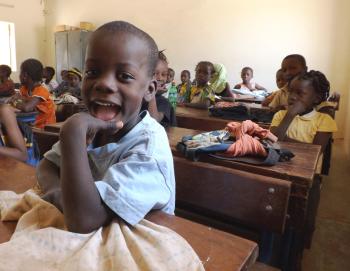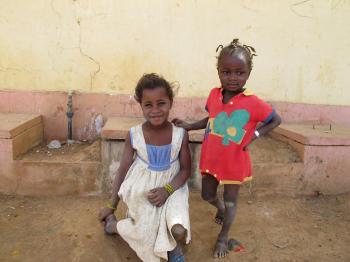
Vi er i Mali
In search of stability

At school (photo: E. Lavenac).
In 1992 Alpha Oumar Konaré won the country's first multiparty elections. The political and social situation in Mali remained fairly stable until March 2012, when a military coup ousted President Touré. Fighting in the north of the country forced hundreds of thousands of people to leave their homes; they fled south or sought refuge in neighbouring countries. After months of heavy fighting, the situation improved by the end of the year, but militants continued to threaten parts of the country. In the summer of 2013, presidential elections were held and UN peacekeeping troops were in place to ensure stability.
Although poverty figures have improved noticeably, many challenges remain
In spite of some improvement in recent decades, Mali continues to be one of the poorest countries in Africa. According to the United Nations Development Programme, 51 per cent of its population lives on less than one US dollar per day. Poverty is particularly persistent in certain rural areas of the country. The rural inhabitants of the Sahel-Saharan region face unimaginably precarious living conditions. Many people depend on subsistence farming and are therefore vulnerable to natural disasters. If crops are destroyed, they face starvation. In recent years, the country has faced severe food shortages that have led to calls for support from the international community.
As investment has been focused on providing food for the population and establishing political stability, the government has struggled to offer adequate health care and education for its people. Access to education remains nothing but wishful thinking for hundreds of thousands of Malians. Although an increasing number of children start school, many drop out by the time they reach secondary level. As a result, only 28 per cent of the population know how to read and write. The literacy rates are higher in urban areas than in rural areas, and higher for men than for women.
As investment has been focused on providing food for the population and establishing political stability, the government has struggled to offer adequate health care and education for its people. Access to education remains nothing but wishful thinking for hundreds of thousands of Malians. Although an increasing number of children start school, many drop out by the time they reach secondary level. As a result, only 28 per cent of the population know how to read and write. The literacy rates are higher in urban areas than in rural areas, and higher for men than for women.
Children in need of a brighter future

Two little girls who had to flee their homes in the north of the country. SOS Children's Villages is providing support to families and children who have been displaced due to the fighting (photo: K. Thomas).
More than one in three Malian children suffers from stunting. Even in the best of times, food security in Mali is precarious. During periods of drought or violence, the situation for Mali's children gets particularly worrying.
The recent political instability has also influenced the lives of children in other ways. According to international reports, armed groups have recruited boys for fighting and girls have been forced to marry members of such groups. Many families have had to flee, leaving their homes and livelihoods behind. As families struggle to find food and a safe place to live, the education of their children suffers. In addition, children are often not protected from violence and the risk of human trafficking.
Discrimination against girls and women persists in many areas of the country and educational and professional opportunities for women are generally very limited. An estimated 92 per cent of women have undergone female genital mutilation. Early marriages and pregnancies are common: over a fifth of Malian women are married by the age of 15 and 75 per cent by the age of 18.
SOS Children's Villages in Mali
SOS Children's Villages has been active in Mali since 1987. We have been running SOS Family Strengthening Programmes in order to support children who are at risk of losing the care of their family. At present, SOS Children's Villages is supporting children and young people in four permanent locations by providing day care, education and medical assistance. When children can no longer stay with their families, SOS mothers care for them in one of the SOS families.
In recent years, we have run two emergency programmes. In 2012, we provided support during the Sahel food crisis and in 2013 to families displaced by the fighting in the northern areas of the country.
In 2015, we started a project to protect "talib̩s" Рchildren attending Quranic schools who are forced to go out to beg. We work in close partnership with local groups to ensure that the children are safe, can go to school and, wherever possible, can return to live with their families. We give children counselling and material goods to improve their living conditions. We provide school kits and uniforms and pay for the children's school and medical fees. We also run workshops on children`s rights and support parents so that they can make enough money to look after their children.
In recent years, we have run two emergency programmes. In 2012, we provided support during the Sahel food crisis and in 2013 to families displaced by the fighting in the northern areas of the country.
In 2015, we started a project to protect "talib̩s" Рchildren attending Quranic schools who are forced to go out to beg. We work in close partnership with local groups to ensure that the children are safe, can go to school and, wherever possible, can return to live with their families. We give children counselling and material goods to improve their living conditions. We provide school kits and uniforms and pay for the children's school and medical fees. We also run workshops on children`s rights and support parents so that they can make enough money to look after their children.